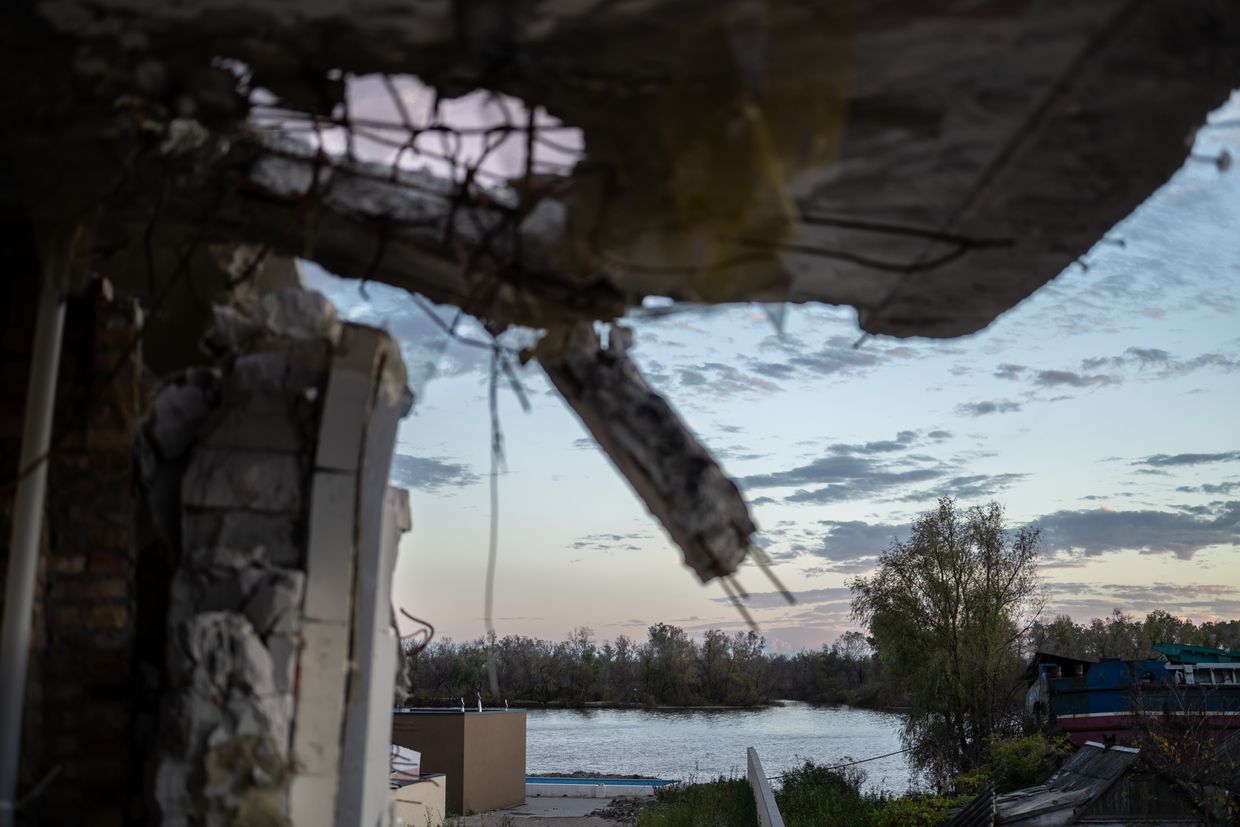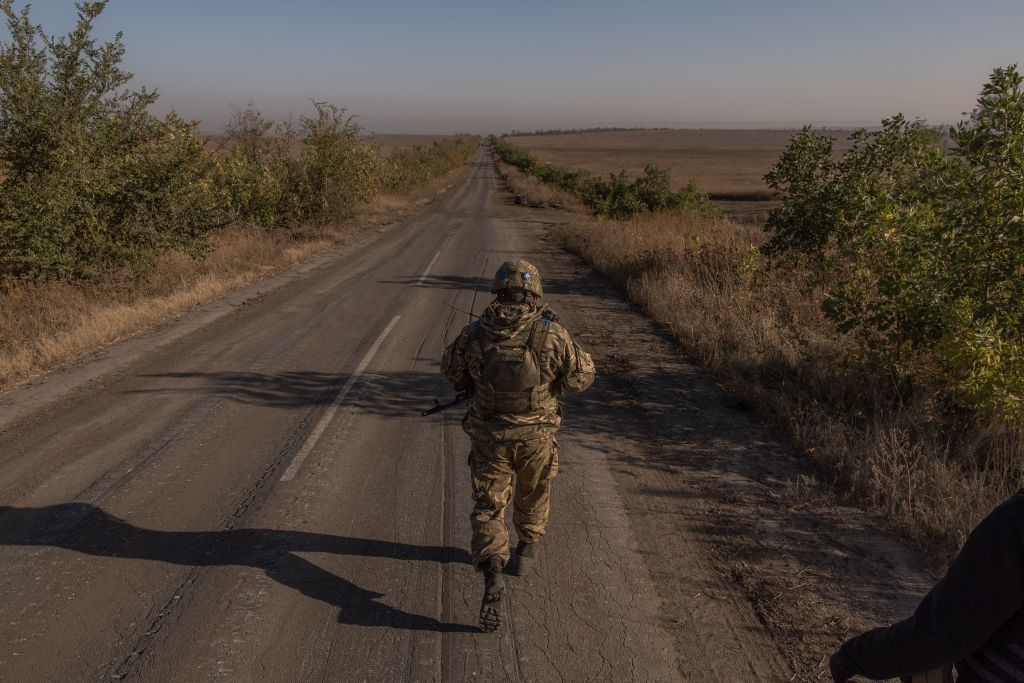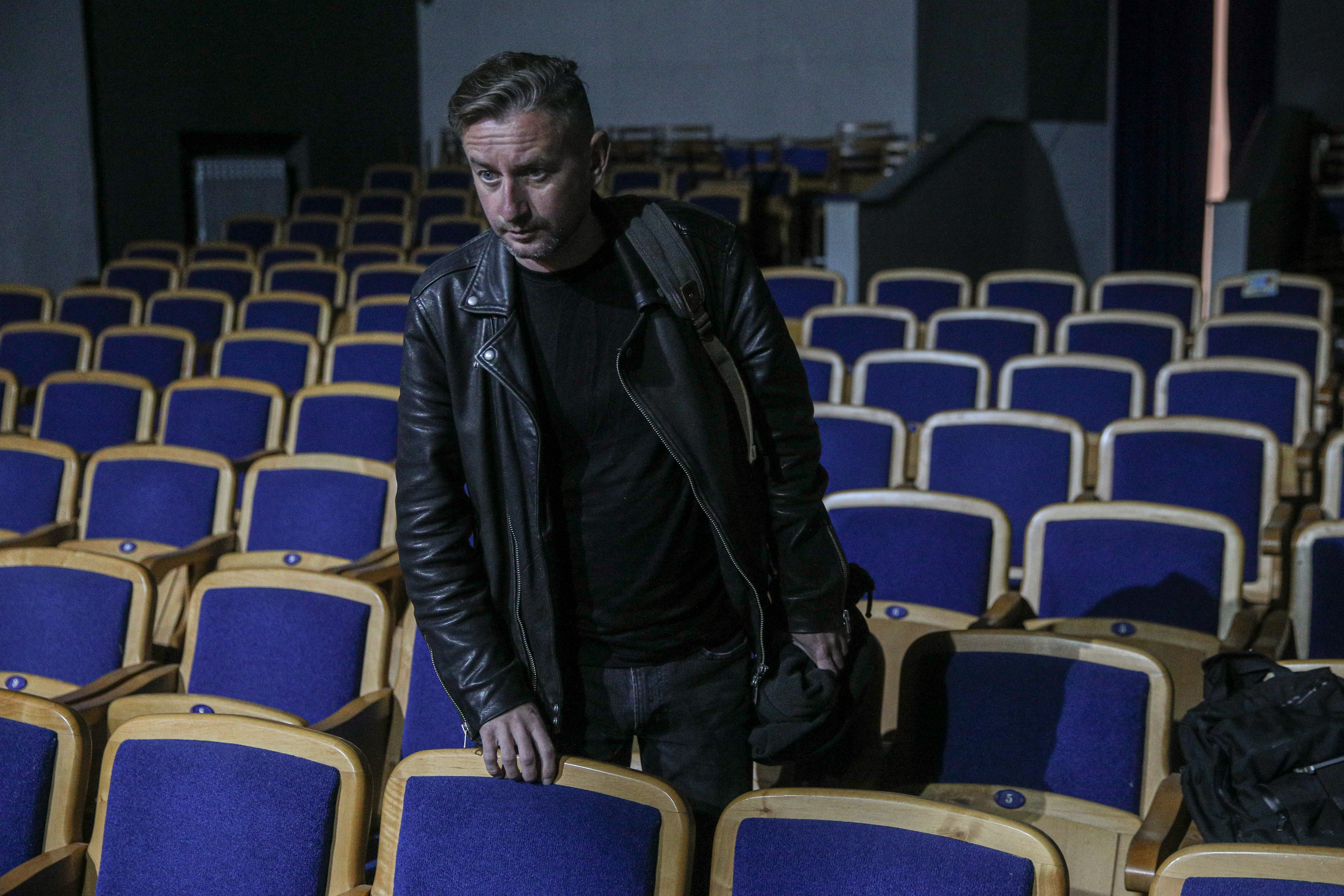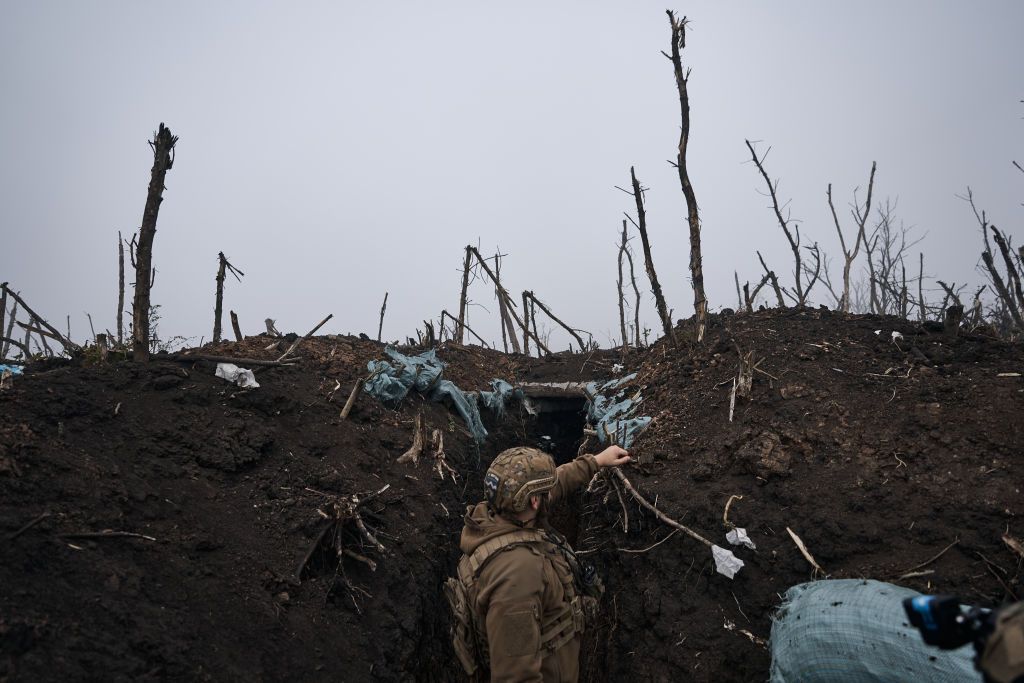Under deadly attacks, Kherson fights to keep life going 1 year after liberation

KHERSON – Sitting in a pitch-dark kitchen with just the flashlight on, 70-year-old Viacheslav Bezprozvanyi warned of an incoming shelling as soon as he heard a swish over him.
Split seconds later, a thick thud of shelling hit the ground a few hundred meters away. The house shook, knocking off a photo frame on the window sill.
"It's a greeting from Russia," Bezprozvanyi joked about the blast with an eerily smile, expecting yet another long night ahead.
Living under heavy Russian shelling since Kherson was liberated on Nov. 11, 2022, Bezprozvanyi remains calm. Bezprozvanyi and his wife are not prepared to leave the city.
Russian forces have intensified their shelling of Kherson and its surrounding areas over the past weeks, killing civilians almost daily. A year after Ukraine's liberation of the only regional capital Moscow managed to capture during the all-out war, Kherson residents are continuing their lives at great risk.
Kherson Oblast Governor Oleksandr Prokudin says this is because Russia is fearing a Ukrainian counteroffensive on the east bank of the Dnipro River, most of which Moscow still holds.
Indiscriminate Russian artillery, tank, and drone attacks are endless, with civilians often calling their chances of survival "a roulette." Since liberation, over 400 civilians were killed and about 1,700 wounded in and around Kherson, according to local authorities.
Staying in the unsafe
Bezprozvanyi's house had already suffered a tank fire attack in October. It was half past midnight, and nearly killed his 67-year-old wife, Nadiia, who was sitting facing the kitchen window at the time.
Miraculously dodging shrapnel and glass pieces flying all over the place, Bezprozvanyi's wife survived without a scratch. But Nadiia Bezprozvana says she now fears any shelling sound and is too afraid to sleep in the house.
"When I was sitting in this room, all the glass fell on me, and I thought I would be cut," she said, tearing up. "And now my head hurts, and my hands shake – I can't calm down."
Bezprozvana acknowledged how the attack psychologically affected her. "After it, I have such stress – I began forgetting everything."
Bezprozvanyi's family is trying to convince him and his wife to at least move to a safer neighborhood in Kherson, further from the Dnipro River. He insisted on staying.
Neither Bezprozvanyi nor his wife are ready to leave the heavily-shelled Kherson.
Their leave-or-stay dilemma is shared by many other Kherson residents, who are struggling to leave the comforts of their homes despite the worsening situation in the city.
Having survived Russia's nine-month-long occupation, the flooding caused by the destruction of the Kakhovka Dam, and constant shelling since liberation, the locals say it's now harder than ever to leave Kherson after staying with their hometown in all of these darkest times.
Locals like the Bezprozvanyi family are taking one day at a time.
Hoping that the shelling would cease someday, the elderly couple is keeping themselves busy by cleaning and repairing the damage caused by the Russian tank fire.
Just before their house was hit, the Bezprozvanyis had just finished an indoor reconstruction after the June flood, caused by Russia's destruction of the major dam, ruined much of their belongings.
The water got halfway through the second floor, and it took weeks to clear it. The two-story house, handbuilt by Bezprozvanyi over roughly 20 years since 1992, smells moldy and wet to this day. In early November, the power finally went back on for the first time since June.
But no matter how tough the conditions get, Bezprozvanyi struggles to part with his house – where he has spent nearly half of his almost 50 years of marriage with Nadezhda.
"It's my spirit, I built it on my own and put everything in this house," he said, recalling how he used his leftover salary to buy materials for the house.
Inside the heavily shelled city
Bezprozvanyi's house is located near the Dnipro River and just outside the most heavily-shelled area in Kherson – microdistrict Korabel, often referred to by locals as "the island."
His street, once full of life with joyful children playing outside, is nearly emptied, and most houses have suffered damage – some worse than others.
Roughly 70,000 of Kherson's 330,000 pre-war population remain in the city.
The local authorities continue to urge the evacuation of civilians living in heavily shelled areas in the Kherson area, particularly families with children.
However, the authorities struggle to win the locals' trust.
Still remembering the early days of the full-scale war, when many local officials either abandoned Kherson or switched sides upon arrival of Russian forces, having any trust in law enforcement is difficult, according to multiple civilians interviewed by the Kyiv Independent.
Prokudin said that he understands this, admitting that the local residents' trust in authorities "could be below average."
A May petition calling on President Volodymyr Zelensky to consider dismissing Prokudin and Roman Mrochko, head of the Kherson City Military Administration, for their "incompetence and inaction" gained over 25,000 signatures – the required bar for Zelensky's reaction.
The case had been passed on to the government, Zelensky said in his answer published in September, but no other official move has been made.
For now, Kherson is holding and gearing up for what is expected to be yet another tough winter, especially as Russia is intensifying its attacks against critical infrastructure in the city.
Evacuation after shelling, however, remains extremely difficult. Prokudin said that his administration immediately knows when and where an attack takes place, but evacuation can't happen until the shelling stops – which could be 20 minutes or more.
The administration's press representative, Oleksandr Tolokonnikov, said that Russian forces are sometimes attacking the same area twice with a time gap – to target emergency service workers who have just arrived at the scene.
Located within a few kilometers from Russian forces on their nearest position on the other side of the Dnipro River, the authorities say there is not much that can help Kherson.
Air raid sirens, which local residents ignore, don't work as they need to because of the city's close proximity to the front line. There is no point in deploying an air defense system in Kherson because it would be extremely easy for the Russians to destroy the expensive equipment, according to Prokudin.
Nothing, even the most advanced air defense system, could protect Kherson from incoming shells or aerial bombs, and the sirens only go off once something hits the city, the governor said.
The hunt for collaborators in Kherson, feeding information to the Russians on the occupied east bank, is also ongoing.
Confirming multiple local and soldiers' concerns, Prokudin said that there are people giving coordinates to the Russians on the east bank of the river – just like the other way around.
Russian reconnaissance drones, such as Orlans, are also flying over the city, and the Russians know where Ukrainian soldiers tend to gather because they also used to spend time there when they occupied the city, according to local authorities and residents.
Multiple attacks on the same target are not rare, likely trying to hit some military target, according to Prokudin.
Such an attack recently took place in the Soviet-era apartment block on the central Ushakova street.
Deadly attacks
An ordinary five-story apartment block on Ushakova Street suffered multiple Russian attacks.
Local residents like 54-year-old Olena Selivanova, living with her elderly mother and friend, thought after each attack that it would be the last. But the Nov. 5 multiple attacks, she says, were not a coincidence.
Citing the trajectory of the attacks, the locals believe that Russia was targeting a gas station right in front of the building.
The third attack happened about half past eight on Sunday evening.
Selivanova was sitting in the kitchen talking to her son on the phone. The blast knocked her off three meters into the corridor, and shattered glass was everywhere, but she luckily only suffered an arm injury – which had to be stitched up the next day.
Her friend, Oleh, however, was sleeping on an armchair when the glass fell on him, cutting his head. "First, he couldn't understand what happened. Then he sat here silently in the corridor... it could be, you know, the realization that he survived," she said.
She said Oleh, who is a bus driver, went to work the next day.
Selivanova's neighbor on the fourth floor suffered worse. The missile broke through the roof, and the 5th floor collapsed onto the living room of the neighbor's apartment.
A mother roughly aged 70 and her daughter had just left the living room a few minutes before the attack, surviving miraculously.
This was the second major attack on Selivanova's apartment building.
On May 3, Selivanova was returning home from the store and had a brief conversation with an elderly couple gardening outside the entrance. She decided to do the same since the flowers looked beautiful, so she went back to grab a shovel.
But before she could head back outside, a missile strike on the building immediately killed the elderly couple. Selivanova remembers how she saw them from the balcony, lying still side by side.
"I don't even look there when I pass because this picture is stuck in my memory," she said.
"It seems to me that there are no safe places in Kherson," she admitted. "(The recent attack) is probably a signal that we need to leave after all."
Life goes on
But despite the constant attacks and some residents leaving for winter, life in Kherson goes on.
More shops and cafes are reopening their doors, and more people are turning to recreational centers to relieve stress.
Just a few days before the anniversary of liberation, Kherson hosted a literary event in a basement, inviting four Ukrainian writers – including well-known poet and novelist Serhiy Zhadan.
A few dozen Kherson residents gathered at the event, buying books so the writers could sign them with a special message. The writers read aloud poems and sections of their novels, many of them about the all-out war.
"I know that maybe someone is waiting for my voice, just waiting for my reflections," Kharkiv-native Zhadan told the Kyiv Independent after the event.
"It is important to exchange energy. It is important that all Ukrainians live not in fear, in anxiety, but with culture."
"(Artists) have no right to remain silent" no matter the struggle, Zhadan said.
A couple of kilometers away, yoga lessons are held regularly.
As the sound of shelling echoes in the background, fly yoga coach Yevheniia Bilonohova instructed her students to balance themselves on an aerial hammock and stretch their bodies.
At an underground gym, safe from the shelling, sports lovers gather – partially for the lack of social interactions.
"Yoga helps psychologically," Bilonohova said.
For many, like in other cities, the gym has been an essential part of their lives during war – even during occupation.
But as winter approaches, the population of the constantly shelled city is due to decrease even further. Some decided to leave due to constant fear and the concern of life-line utilities during winter – particularly heating.
Understanding the limitations of her physical capabilities to flee if anything happened, 85-year-old Liudmyla Bukakyna has accepted her kids' plea to spend the winter in Poland with the rest of her family.
"I'm about to arrive in Kyiv, and I still can't believe that I'm leaving (Kherson)," Bukakyna said on the day train ride from Kherson to the capital.
______________________________________________________
Note from the author:
Hi, this is Asami Terajima, the author of this article.
Thank you for reading our story. It was my first time in Kherson since November 2022, and it was moving to see how the local residents are fighting to keep their normal life going despite the incessant Russian shelling. The people in Kherson were very warm and welcoming.
Kherson's liberation councides with the Kyiv Independent's birthday. I remember how happy we were in 2022, celebrating both the liberation of Kherson – which of course came at a heavy price for Ukraine – and the one-year-anniversary of the Kyiv Independent. But it's much more difficult on the battlefield this year.
To help the Kyiv Independent continue telling stories that would otherwise not be told, please consider becoming our supporter.























































































